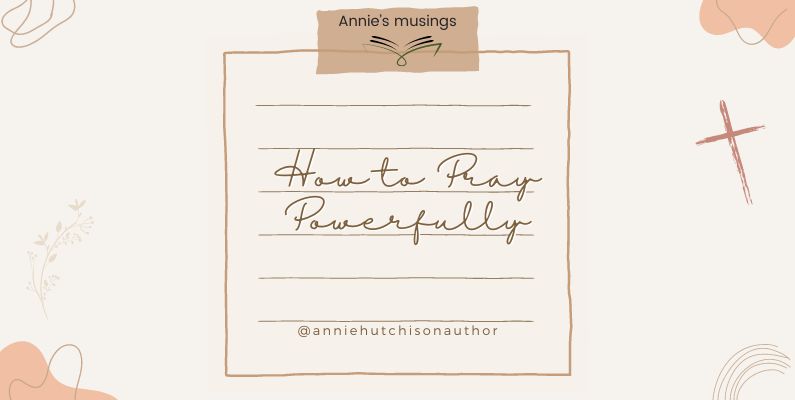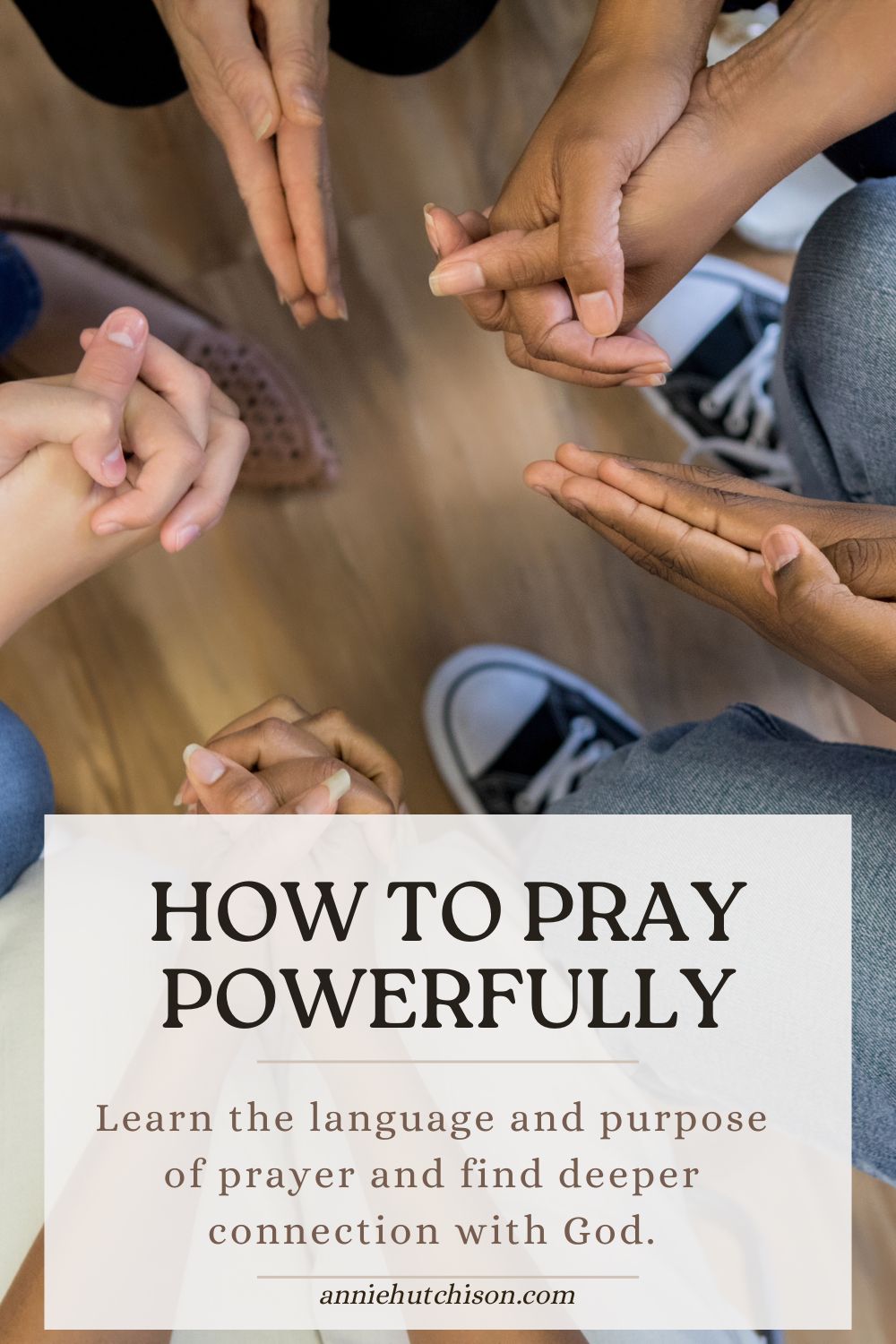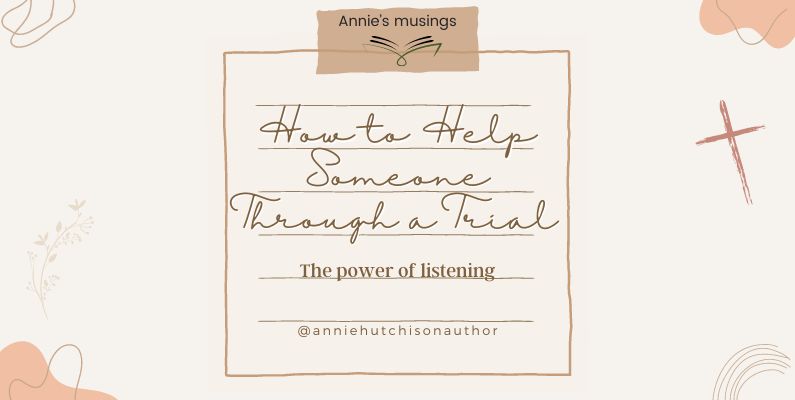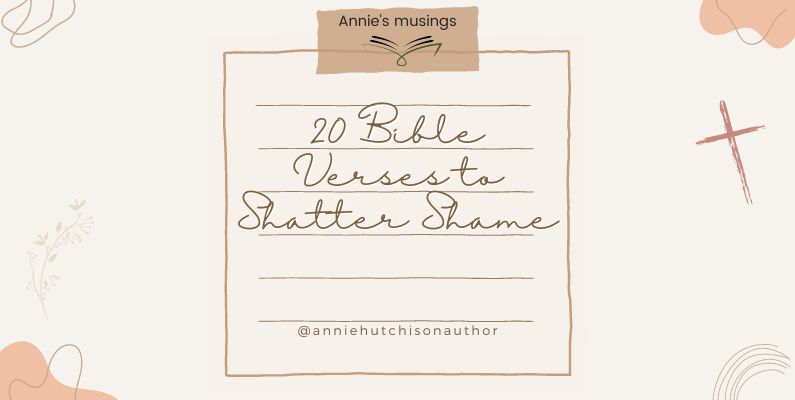
How to Pray Powerfully
For the past few years, I have wanted to improve my prayer life. I’ve worked on the discipline of praying daily, my knowledge and understanding of the purpose of prayer, but yesterday I was struck with insight as to the language of prayer, and this is what I want to share with you.
See the purpose of prayer is relational. We see this in passages like Matthew 6:5-15. Jesus explains that prayer is not about looking religious or better than others and that even our requests and needs are known by the Father before we even ask. So then our prayers don’t need to be fixated on our needs or our desire to seem holy, but rather, on aligning our hearts and wills to God. And we see this demonstrated in the Lord’s Prayer.
If you spend time around Christians at all, chances are you have already encountered prayer requests that sound something like, “Please pray for my marriage. We’re really struggling.”
Or “My aunt has cancer. Please pray for her healing.”
Or “My husband lost his job and we’re worried how we're going to make it. Please pray for financial provision.”
I could keep going, but I want to instead focus on how we take these very good, and very real prayer requests to God.
James 5:16 says “The prayer of a righteous person has great power as it is working.”
But all so often, I feel like God doesn’t hear or answer my prayers. And yet In 2 Corinthians 5:21, I am told that Jesus died to make me the righteousness of God.
So if I am righteous because of what Christ has done, then it stands to reason that I should also have powerful prayers, right?
This begs the question, why do my prayers feel unanswered?
I believe it is because all too often, I come to prayer with the wrong motives and understanding.
Frequently, I have listened to and prayed requests that are transactional. When we see prayer as a transactional duty or some sort of magical protection for our loved ones, we treat it so radically differently than entering into a royal throne room to speak intimately with our Heavenly Father, the King of kings.
I have said prayers like, “Dear God, please bless my friend’s marriage and please help them to love each other and relate to each other better. In Jesus’ name. Amen”
I frequently fail to address the Holy God of Armies as Jesus did: “My Father.”
I frequently fail to ask what his will is in the situation I am concerned about.
I frequently pray for what I think is best, what my will and ways are and then I am disgruntled when God fails to follow my good-intentioned but arrogantly ignorant prayer requests.
Has this ever happened to you? Have you ever felt disappointed in God for what he allows or fails to protect you or your loved ones from?
On Sunday, my pastor said that the “Prayer of Faith” mentioned in James 5:15 is a simple request of God and that the faith was in the person of God, not the desired outcome of the prayer.
I love this reminder that when we pray, we are to be loyal, committed and hopeful in the powerful person of God, not our limited, often short-sighted prayer requests.
So if I were to pray for someone’s marriage, in a relational way that more closely aligns with the Lord’s Prayer model what would it sound like?
I believe it could sound something like this:
“Oh, my Father, my friend’s marriage is in distress. I know that your heart is for marriage and that what you have joined together, you desire that no one tear apart. Please protect them from the schemes of Satan. Please open their eyes to the beauty and the lessons you desire to equip them with in this trial. Father, please reveal your will to them and give them the grace and desire to follow your ways in how they relate to each other. Help them to forgive each other as you forgive them. And help them to desire to be sanctified and Holy so that they may gain freedom from the sin-habits that are causing harm to their marriage. I ask this in Jesus’ name. Amen.”
This prayer is relational, it is asking for God’s will and ways, and it is in alignment with God’s word. When I pray this way, I tend to see a greater impact and more answered prayers. When I pray this way, I align my own heart to what God’s heart wants and I don’t struggle with feeling resentful or disappointed in how God chooses to answer my prayers.
Now, something important to note is that even when we don’t pray “correctly” or even when we don’t know what words to say, the Holy Spirit himself prays on our behalf and intercedes for us (Romans 8:26-27). We never need to fear that God will not be pleased with our “wrong” prayers or that he will only answer us when we pray “correctly.”
My writing about a better way to pray is meant to help those of us struggling with being disappointed in God. It is meant to address my own heart problems and allow me to find a deeper sense of connection with a perfect and loving Father.
How you pray, will not change who God is or his will for that person or request. But how you pray can change who you are and how you see the world around you.
Today is meant to shape our perspective on the spiritual discipline of prayer. It is not some set of rigid tools to make you feel fearful to pray with others or for others.
God delights in you and desires that you would draw near to him as you are, not once you are good enough. So please don’t let anything I write hold you back from praying to the God who hears you.
I also want to mention that sometimes, our prayer requests go unanswered because we need to keep persisting and praying. All too often we give up on praying way too quickly. Some prayer requests can take a lifetime. But when we see prayer as an intimate conversation with the Lover of our souls, those repetitious prayers become less burdensome to keep repeating.
My prayer for you, Dear Reader, is that you would draw near to the Father and that you would tell him everything that is on your heart. That your eyes would see prayer as relational and not transactional and that as you dive deeper into the practice of prayer, your heart and perspective would reflect that of the Father.
Want this blog sent directly to your inbox? Subscribe below.








